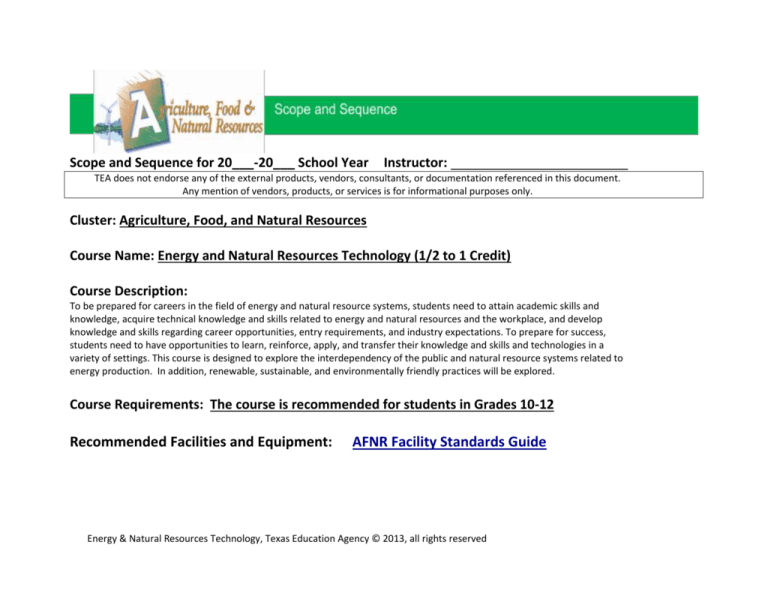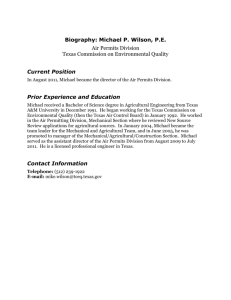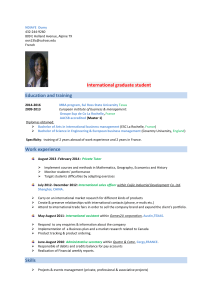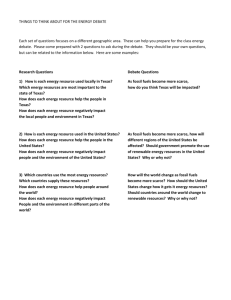
Scope and Sequence for 20___-20___ School Year
Instructor:
TEA does not endorse any of the external products, vendors, consultants, or documentation referenced in this document.
Any mention of vendors, products, or services is for informational purposes only.
Cluster: Agriculture, Food, and Natural Resources
Course Name: Energy and Natural Resources Technology (1/2 to 1 Credit)
Course Description:
To be prepared for careers in the field of energy and natural resource systems, students need to attain academic skills and
knowledge, acquire technical knowledge and skills related to energy and natural resources and the workplace, and develop
knowledge and skills regarding career opportunities, entry requirements, and industry expectations. To prepare for success,
students need to have opportunities to learn, reinforce, apply, and transfer their knowledge and skills and technologies in a
variety of settings. This course is designed to explore the interdependency of the public and natural resource systems related to
energy production. In addition, renewable, sustainable, and environmentally friendly practices will be explored.
Course Requirements: The course is recommended for students in Grades 10-12
Recommended Facilities and Equipment:
AFNR Facility Standards Guide
Energy & Natural Resources Technology, Texas Education Agency © 2013, all rights reserved
Week
Number
TEKS Taught
Topic/Unit Title
130.11c1A,B
The student develops an improved supervised agriculture experience program as it
relates to agriculture, food, and natural resources:
The student will plan, propose, conduct, and evaluate entrepreneurship; placement;
exploratory; research, either experimental or analytical; improvement; supplementary;
laboratory-based; or other identified, SAE as an experiential learning activity and apply
proper record-keeping skills as they relate.
The student develops an improved SAE program as it relates to agriculture, food, and
natural resources:
The student will design and use a customized record-keeping system for the individual
supervised experience, participate in youth leadership opportunities to create a wellrounded program, and produce a challenging approach for a local POA in agriculture.
The student used instructional time to conduct field and laboratory investigations
using safe, environmentally appropriate, and ethical practices in a documented
supervised experience:
The student will demonstrate safe practices during field and laboratory investigations in
a documented supervised experience and use accepted procedures for the use and
conservation of resources and for the safe handling of materials.
The student learns the employability characteristics of a successful employee:
The student will identify career development and entrepreneurship opportunities in the
fields of energy and natural resources and apply competencies related to resources,
information, interpersonal skills, and systems of operation in energy and natural
resources.
The student learns the employability characteristics of a successful employee:
The student will demonstrate knowledge of personal and occupational health and
safety practices in the workplace and identify employers’ expectations.
Week 1
130.11c1C,D,E
Week 2
130.11c2A,B
Week 3
130.11c3A,B
Week 4
130.11c3C,D
Week 5
Week 6
130.11c3E
The student learns the employability characteristics of a successful employee:
The student will demonstrate leadership skills to accomplish organizational goals.
Energy & Natural Resources Technology, Texas Education Agency © 2013, all rights reserved
Week
Number
130.11c4A,B
The student determines the importance and scope of energy and natural resources:
The student will identify various types of natural resources and discuss renewable, nonrenewable, and sustainable energy resources and their availability.
130.11c4C
The student determines the importance and scope of energy and natural resources:
The student will define impacts of energy production on natural resources and the effect
on the agricultural economy.
130.11c4D
The student determines the importance and scope of energy and natural resources:
The student will analyze the geographic and demographic distribution of natural
resources.
130.11c5A
The student analyzes ethical issues related to natural resource management and
energy production:
The student will compile examples of different lease agreements used for leasing
minerals and natural resources.
Week 7
Week 8
Week 9
Week 10
130.11c5B,C
Week 11
130.11c5D
Week 12
Topic/Unit Title
TEKS Taught
The student analyzes ethical issues related to natural resource management and
energy production:
The student will understand landowner and leasing company relationships and review
public interest in natural resource management.
The student analyzes ethical issues related to natural resource management and
energy production:
The student will understand the impacts of natural resource management on the
landowner.
Energy & Natural Resources Technology, Texas Education Agency © 2013, all rights reserved
Week
Number
130.11c6A,B
The student understands energy and natural resource policies at the local, state,
and national level:
The student will identify policy affecting the use of natural resources and identify
policy affecting energy production.
130.11c6C,D
The student understands energy and natural resource policies at the local, state,
and national level:
The student will research ecological controls of natural resources and identify state
and federal agencies that have natural resource management responsibilities.
130.11c6E
The student understands energy and natural resource policies at the local, state,
and national level:
The student will define the roles of government, society, and property owners in the
development of energy and natural resource policy.
130.11c7A,B
The student recognizes the purpose of land use planning:
The student will identify the major categories of land use and evaluate considerations
for land use planning, including ecological benefits.
130.11c7C,D
The student recognizes the purpose of land use planning:
The student will discuss advantages and disadvantages of land use planning and
compare and contrast land use policy trends within the state.
Week 13
Week 14
Week 15
Week 16
Week 17
130.11cE
Week 18
Topic/Unit Title
TEKS Taught
The student recognizes the purpose of land use planning:
The student will discuss the advantages and disadvantage of land use planning for
energy production.
Energy & Natural Resources Technology, Texas Education Agency © 2013, all rights reserved
Week
Number
TEKS Taught
Topic/Unit Title
130.11c8A
The student identifies water and wastewater use and management:
The student will identify municipal, industrial, and agricultural uses of water, including
recycling opportunities.
Week 19
130.11c8B,C
Week 20
130.11c8D
The student identifies water and wastewater use and management:
The student will identify sources of point source and non-point source pollution
associated with municipal, industrial, and agricultural uses.
130.11c8E,F
The student identifies water and wastewater use and management:
The student will describe effective management practices commonly used to abate
point and non-point sources of pollution and discuss how the different types of water
uses impact water availability.
130.11c8H
The student identifies water and wastewater use and management:
The student will review water quality policy, including the agricultural storm water
exclusion, and how it affects the decisions made in agricultural production.
130.11c8G,I
The student identifies water and wastewater use and management:
The student will research water use legislation and discuss the potential impacts of
energy production on water resources.
Week 21
Week 22
Week 23
Week 24
The student identifies water and wastewater use and management:
The student will discuss how different types of water uses pollute water resources
and define point source and non-point source pollution.
Energy & Natural Resources Technology, Texas Education Agency © 2013, all rights reserved
Week
Number
TEKS Taught
130.11c9A,B,C
Week 25
The student describes air quality associated with energy production:
The student will define air pollution, research air quality legislation, and identify
sources and effects of air pollution from energy production.
130.11c9D,E
The student describes air quality associated with energy production:
The student will discuss different emission management strategies and identify air
pollution controls used in energy production.
130.11c10A,B
The student examines soil erosion as related to energy production:
The student will identify sources of energy production that can contribute to soil
erosion and illustrate harmful effects of soil erosion.
130.11c10C,D
The student examines soil erosion as related to energy production:
The student will discuss legal aspects of soil erosion and list soil erosion control
methods and programs.
130.11c11A,B
The student analyzes the identification, handling, storing, and disposing of waste
and hazardous materials:
The student will identify types of waste and hazardous materials and research
legislation related to waste and hazardous materials.
130.11c11C,D
The student analyzes the identification, handling, storing, and disposing of waste
and hazardous materials:
The student will identify entities responsible for waste and hazardous material
management and describe safe handling, storing, and disposal of waste materials,
including composting and recycling.
Week 26
Week 27
Week 28
Week 29
Week 30
Topic/Unit Title
Energy & Natural Resources Technology, Texas Education Agency © 2013, all rights reserved
Week
Number
TEKS Taught
130.11c12A,B
Week 31
130.11c12C,E
Week 32
130.11c12D
Week 33
130.11c12F,G
Week 34
130.11c12H,I
Week 35
130.11c12J,K
Week 36
Topic/Unit Title
The student learns the processes for producing energy from agricultural crops,
biomass, fossil fuel, wind, solar, and geothermal sources:
The student will identify agricultural and silvicultural crops and bi-products suitable
for renewable energy production and discuss production processes for agriculturaland silvicultural-based biofuels.
The student learns the processes for producing energy from agricultural crops,
biomass, fossil fuel, wind, solar, and geothermal sources:
The student will describe the fundamentals for oil, gas, and coal recovery and
compare and contrast coal mining methods and the environmental considerations
associated with each.
The student learns the processes for producing energy from agricultural crops,
biomass, fossil fuel, wind, solar, and geothermal sources:
The student will compare and contrast oil and gas drilling methods and the
environmental considerations associated with each.
The student learns the processes for producing energy from agricultural crops,
biomass, fossil fuel, wind, solar, and geothermal sources:
The student will analyze advantages and disadvantages of wind-generated energy and
identify public policy considerations associated with transmission line construction to
move wind-generated energy.
The student learns the processes for producing energy from agricultural crops,
biomass, fossil fuel, wind, solar, and geothermal sources:
The student will locate areas in the state that have geothermal energy production
potential and explain the benefits of geothermal energy.
The student learns the processes for producing energy from agricultural crops,
biomass, fossil fuel, wind, solar, and geothermal sources:
The student will identify solar energy systems and describe the function of each and
identify the environmental considerations associated with biofuels and wind energy.
Energy & Natural Resources Technology, Texas Education Agency © 2013, all rights reserved
Resources:
Websites with useful information on:
Natural Resource Conservation Service http://www.nrcs.usda.gov
Environmental Protection Agency http://www.epa.gov
Texas Natural Resource Server http://texnat.tamu.edu
Texas Comm. on Environmental Quality http://www.tceq.state.tx.us
Texas Water Resources Institute http://twri.tamu.edu
TX Water Code- Sect. 26.001 Definitions http://law.onecle.com/texas/water/26:001.01.html
Texas Environmental Profiles http://www.texasep.org/html/wql/wql.html
Texas Water Development Board http://www.twdb.state.tx.us
Texas State Energy Conservation Office http://www.infinitepower.org
Revised by: Sarah Danek, Texas A&M University.
Energy & Natural Resources Technology, Texas Education Agency © 2013, all rights reserved










